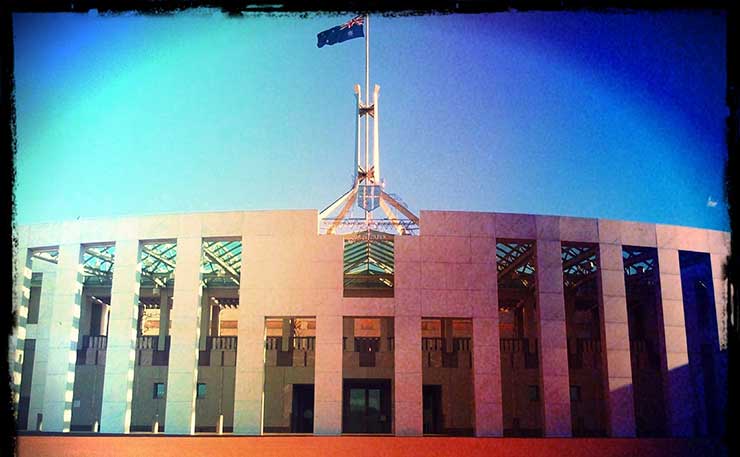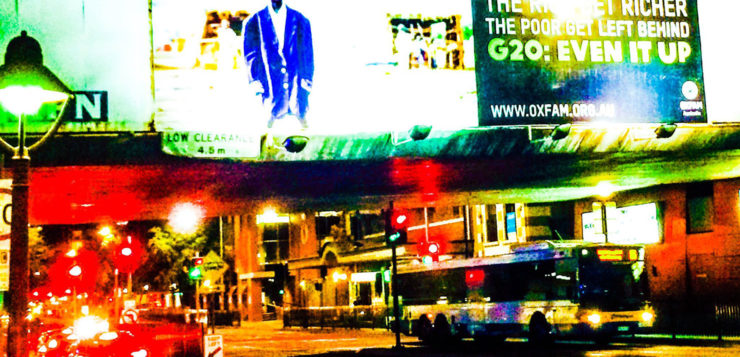As 2023 comes to an end, Alex Vickery-Howe contemplates the key ‘empathy deficit’ that underpins our national politics.
I purchased a new flat in late 2020 and moved in, recently, in late 2023. COVID was the villain in the room… but, in the midst of an horrific global pandemic, I’m not pretending it was cause for violins. Not even tiny ones.
Life moved on while I was praying the builder wouldn’t go bankrupt.
In the intervening years, I picked up a small dog… who is exactly the right snack size for my parents’ adorable but territorial maybe-dingo. Consequently, my partner and I have been living in a series of AirBnBs, rather than risk the irreparable family rift that would come from two physically mismatched canine roommates.
I won’t list the suburbs here, but, as we bounced from house to house, we encountered a range of temporary neighbours. For a few months we lived in an openly hostile street where there were multiple arrests, strange backyard burnings, wandering children, wandering pets, and screaming monologues in the night. I have no idea what was going on, except that it was dramatic, and it was desperate. Being middleclass and spineless, I took to bolting the door early. My partner promised to do the same, except for the one night she left the key in the lock.
To be clear, we are not wealthy people – look at me, I’m a writer – but moving around that much, over that amount of time, brought home the stark economic and sociocultural differences that pepper our glorified country town. The hard fact is that people are living parallel lives. We’re not seeing each other. We’re not empathising.
It’s unfashionable to admit it, but here I go: class is real in Australia. We like to think we’re above the pompous pyramid of UK politics, or the tiresome ‘real people vs. cultural elites’ rhetoric that keeps red and blue states bitching about each other in the US, but that’s not real life. In our shared imagination, we’re all larrikins, we’re all just getting by, and we all start on a level playing field….
Come on, that’s bullshit.
According to the Australian Council of Social Service in partnership with the University of New South Wales, the income gap between the affluent and the disadvantaged – or, to use words that are less opaque and actually less condescending, the rich and the poor – is enormous. Those in the top 20 percent are earning approximately six times that of their fellow citizens in a lower-class bracket. Possibly even more. Are we okay with this?

Many Australian citizens, myself included, struggle to keep on top of our mortgages. We dig into shallow pockets to pay for health insurance, keep our cars running, feed the pets, and even get the toilet paper orders in on time. Well, the latter is probably down to lack of organisation. I’m not pretending to be disadvantaged, however… as I’m able to work towards something. All told, I’m doing alright. I’m comfortably middle class.
Many, many other Australians will never own property. They will be forced to neglect their health, drive while unlicensed, struggle to feed the children, and grow increasingly disenfranchised as successive governments ignore them. Working towards something may feel illusory, like rolling along a hamster wheel – there is no forward momentum no matter how hard they strive.
A tiny number of Australians, meanwhile, have insanely large yachts. No, I’m serious… insanely large.
Put the figures together and the narrative is abundantly clear: the rich are fat, the middle class are dieting for their future, and many others are starving with no sense of escape. The discrepancy between these extremes is vile, and we don’t do anyone any favours by pretending that class doesn’t exist. Cost of living, rising homelessness, young people skipping meals to keep the heater running… when did Australia become the land of dog eat dog? Or, returning to my family dilemma, almost-dingo eats half-Havanese?
We are allowing the economic imbalance of our society to go scarcely acknowledged culturally and politically, even while we claim to live in an age of compassion and inclusion.
The whole point of the Labor experiment is to close this gap. And they’d better… we all know the Coalition sure as heck won’t.
The consequences of class blindness – that callous ignorance or indifference that remains fashionable, even while we draw attention to every other microaggression in our lives – is the increased fracturing of civil society, the rise of political extremists around the world, and the disempowerment of emerging generations.
Class blindness leads to bubbles. Those bubbles house different realities.
In case you were frozen in carbonite, earlier this year the referendum to change the constitution and establish a First Nations Voice to Parliament failed within barely an hour of the commentary kicking off in my household. If you blinked, you missed Antony Green. Of course, the last thing the internet needs is another mouthy white Australian dissecting this event. I’ve not written this article to discuss what the referendum itself means for our nation’s future. On that score, I can only say that I voted ‘Yes’ and I hoped many others would too.

But, while that was my hope, it was hardly my expectation. My real surprise on the night was how genuinely shocked my friends were. Shocked and horrified, and blindsided. This is what happens when you live in a bubble.
Others lived in a bubble where the UN was going to take over Australia, where the Voice would lead to the mandatory redistribution of land, or where COVID was created to control and monitor the population (newsflash tinfoil mannequins: we already have social media for that). It’s easy to be frustrated and alarmed by the blatant misinformation, by the ‘If you don’t know, vote no’ drivel that courts wilful ignorance and wretched laziness – Ray Martin was spot on about that – and, perhaps most frighteningly, by the active participation of the same bad operators who pull the big saggy string on Donnie Trump’s back.
It’s all terrible.
Nevertheless, putting the particulars of the referendum debate to one side, the stats and their meaning are clear. It was the well-heeled suburbs around the country that supported the Voice and, in the main, the less comfortable suburbs that accepted the conspiracy theories, chose not to engage at all, or lashed out in bitterness and anger.
That’s the takeaway for white Australia – it wasn’t the Voice itself that was dividing the country, it was our own pre-existing, scarcely acknowledged division. It’s time we talked about class.
We need to stop pretending we’re a classless society and be honest about the failure of trickledown economics, the failure of our elected leaders… the failure of representative democracy itself… to confront the income gap. Right now, we’re struggling to recognise, in any meaningful or pragmatic way, that the gap exists. We’re still being weird about it.
A friend recently told me that if lobsters or crabs are kept in a bucket, in some horrible restaurant, and one is lucky enough to climb halfway out, the others will pull them back in – nobody is allowed to rise above the collective horror show. Apparently it’s a cliché that everyone else already knew, but this image of counterproductive communal despair has stayed with me. When the class divide is this strong, and yet unseen, people will pull others down into desolation. I think that’s what this country is doing to itself, and why we have an empathy deficit.
Class doesn’t tell the whole story – and acknowledging this class division certainly doesn’t lessen the pain and rejection felt by those who give everything to important social causes – but, if we’re honest, if we accept the evidence, class is the clearest indicator of what’s making these bubbles so completely out of touch with each other. Brexit has shown us what happens when class differences are exploited. MAGA has shown us what happens when class differences are weaponised.
The only slim silver lining is that this doesn’t bode well for the evil potato. Peter Dutton hasn’t made any ground against the Teal Independents, and he is going to have to pivot if he wants to appeal to his upper-class North Shore base. Perhaps he might manage to pivot to something semi-clever next time, instead of more cheap lies and stale slogans.
On the other hand, if we want the big ideas to succeed, if we want our civilisation to unite and civil behaviour to progress…if want these bubbles to finally burst and splatter, we have to start framing our debates in class terms.
Reality doesn’t change just because the discussion makes us feel socially awkward.
Donate To New Matilda
New Matilda is a small, independent media outlet. We survive through reader contributions, and never losing a lawsuit. If you got something from this article, giving something back helps us to continue speaking truth to power. Every little bit counts.




